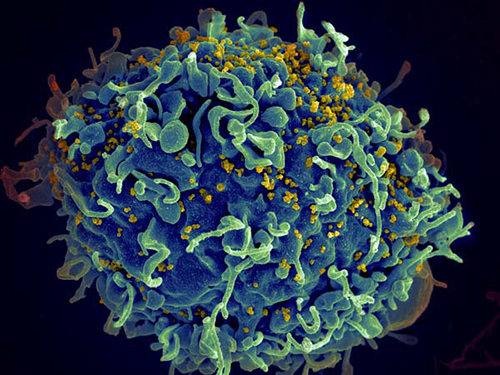Archived Content
The National Institute of Mental Health archives materials that are over 4 years old and no longer being updated. The content on this page is provided for historical reference purposes only and may not reflect current knowledge or information.
HIV Can Spread Early, Evolve in Patients’ Brains
Findings add urgency to screening, treatment – NIH-funded study
• Press Release
The AIDS virus can genetically evolve and independently replicate in patients’ brains early in the illness process, researchers funded by the National Institutes of Health have discovered. An analysis of cerebral spinal fluid (CSF), a window into brain chemical activity, revealed that for a subset of patients HIV had started replicating within the brain within the first four months of infection. CSF in 30 percent of HIV-infected patients tracked showed at least transient signs of inflammation – suggesting an active infectious process – or viral replication within the first two years of infection. There was also evidence that the mutating virus can evolve a genome in the central nervous system that is distinct from that in the periphery.
“These results underscore the importance of early diagnosis and treatment with antiretroviral therapy,” said Dianne Rausch, Ph.D., director of the Division of AIDS Research of the NIH’s National Institute of Mental Health (NIMH). “Any delay runs the risk that the virus could find refuge and cause damage in the brain, where some medications are less effective – potentially enabling it to re-emerge, even after it is suppressed in the periphery.”
NIMH grantees Serena Spudich, M.D., of Yale University, New Haven, Connecticut; Ronald Swanstrom, Ph.D., of the University of North Carolina, Chapel Hill; Richard Price, M.D. , University of California, San Francisco; and Christa Buckheit Sturdevant, Ph.D., UNC (now at Duke), and colleagues, report on their findings March 26, 2015, in the journal PLoS Pathogens.
Prior to the study, it was known that HIV readily penetrates the brain and can trigger neurological problems and eventually cause dementia over the course of the infection. Yet there was little evidence about how quickly it can take hold and thrive there. Nor was it clear to what extent the brain serves as a hard-to-reach hideout from which the virus might re-infect the body – even if it is eliminated from peripheral blood and lymph node tissue by treatment.
To learn more, the researchers compared evidence of HIV activity in CSF versus blood from 72 untreated HIV-infected patients over the first two years of their infection. Overall, 10-22 percent of the patients showed evidence of HIV replication or inflammation in the brain at the different time points analyzed within the first two years – and the signs persisted over time in about 16 percent of the participants.
The evidence suggests that in most patients peripheral forms of the virus infect immune cells that spread to the brain via blood. Yet in some patients, genetic versions of the virus not found in blood evolve in the brain environment. So it could become an independent, compartmentalized viral reservoir, capable of generating treatment-resistant mutant forms that could break out and re-infect the rest of the body after seemingly successful treatment, explained Rausch.
Whether the potential brain damage caused by early HIV replication and inflammation might be reversible with antiviral therapy awaits further research, said Swanstrom.

Source: Seth Pincus, Elizabeth Fischer and Austin Athman, National Institute of Allergy and Infectious Diseases, National Institutes of Health.
Reference
Compartmentalized replication of R5 T Cell-Tropic HIV-1 in the central nervous system early in the course of infection. Sturdevant CB, Joseph SB, Schnell G, Price RW, Swanstrom R, Spudich S. PLoS Pathogens, March 26, 2015.
Grants
MH099979 , MH101024 , MH094177 , MH074466
About the National Institute of Mental Health (NIMH): The mission of the NIMH is to transform the understanding and treatment of mental illnesses through basic and clinical research, paving the way for prevention, recovery and cure. For more information, visit the NIMH website.
About the National Institutes of Health (NIH): NIH, the nation's medical research agency, includes 27 Institutes and Centers and is a component of the U.S. Department of Health and Human Services. NIH is the primary federal agency conducting and supporting basic, clinical, and translational medical research, and is investigating the causes, treatments, and cures for both common and rare diseases. For more information about NIH and its programs, visit the NIH website .
NIH…Turning Discovery Into Health®
